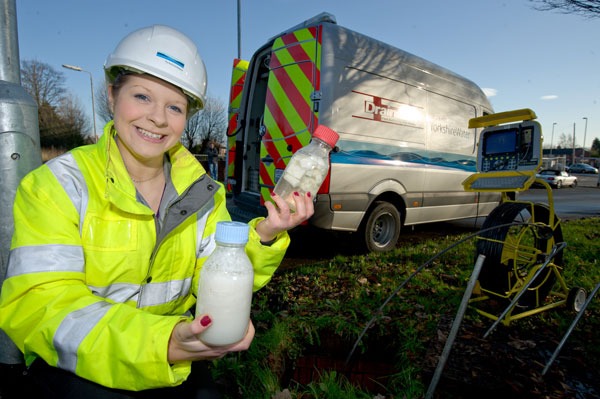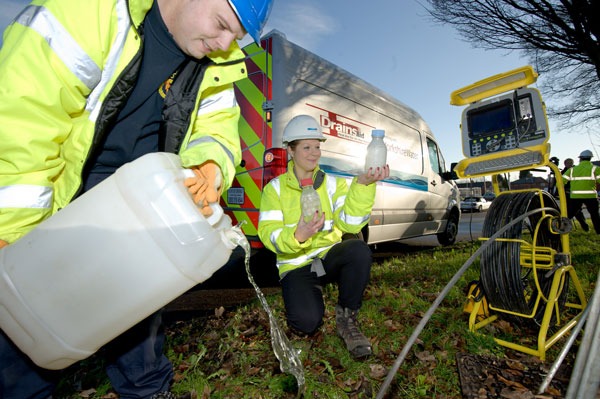
Trillions of fat-busting bugs are being deployed in sewers across Harrogate and Ripon from Friday 4 May to get rid of fat blockages and prevent pollution.
The innovative and environmentally-friendly treatment process is being targeted at hot-spots across Harrogate, Knaresborough and Boroughbridge where build-ups of fat, oils and greases are causing repeated problems.
It works by using organically grown bacillus bacteria, which is commonly found in the human gut, to feast on the fat, oils and grease, with the bacteria being mixed with non-chlorinated water before being poured into the sewer.
Cooking fat, oils and grease get into the sewer from household drains, usually via the kitchen sink and appliances such as dishwashers. Over time, these substances build up on the inside of the sewer pipe and harden, reducing the flow capacity of the pipe and causing blockages, which can in worst case scenario’s lead to sewers flooding people’s homes and the environment.
In the last six months, crews have attended more than 200 jobs to remove sewer blockages in Harrogate, Knaresborough and Boroughbridge, with 30 jobs carried out in March 2012 alone.

On a regional level, the company removed almost 19,000 blockages from its 54,000km sewer network in 2011, with approximately 38% of these being caused by people pouring fat, oil or grease down the sink or flushing baby wipes, sanitary items or nappies down the toilet, at a cost of more than £2 million.
Indeed the total amount of fat, oil and grease removed by the company from its sewers last year was in the region of 2,000 tonnes – equivalent to the weight of 250 empty double decker buses or 400 average sized adult African elephants.
Patrick Killgallon, pollution manager at Yorkshire Water, said:
Having your home filled with waste from your toilet is a very unpleasant experience which no one should ever have to suffer, which is why we work hard to encourage people to think twice before they pour left over fat down the plug hole or flush the odd make-up wipe down the toilet.
This said, we’ve already carried out dozens of jobs this year to remove blockages in Harrogate and surrounding areas, which shows the sheer scale of the issue we all face.
So whilst we continue to encourage customers to think before they pour things like fat down their sink, we’re also looking at new and innovative approaches to tackling this age old problem to support current practices such as jetting sewers with a high pressure hose.
The deployment of fat-busting bugs in our sewer network is an example of this, with these ‘good’ bacteria literally feasting on solidified fat in our sewer. And because these bacteria constantly multiply in the right environment, we can leave them to get on with their job in our sewers, seven days a week, 24 hours a day, without the need for regular dosing.
Consequently, we’re confident their introduction will significantly help to reduce fat, oils and grease blockages in the region, ensuring waste water from local homes and businesses can flow freely to our sewage works where we can recycle it properly before returning it to the environment.
Fat-busting bugs were deployed by Yorkshire Water on a trial basis at a number of spots in the region over the festive period, but their use in Harrogate, Ripon and Knaresborough is one of the first times they have been used in a sustained fashion.
It’s also great news for the environment, with 2011 figures showing that sewer blockages accounted for around a third of the 335 pollution incidents, with a significant proportion of these being due to build-ups of fats, oils and grease, linked to discharges from the company’s waste water network.
Mr Killgallon added:
Even though we’re now responsible for more than 54,000 kilometres of sewers, tens of thousands of overflows and more than 600 sewage treatment works, we still take the view that one pollution incident is one too many, which is why we’re working hard and improving our network through significant investment, as well as encouraging our customers to do the right thing.
The company is also reminding customers to dispose of fat in an easy and environmentally friendly way by letting it cool and harden, before scraping it into a bin, or mixing it with other ingredients such as crushed unsalted peanuts to create bird feed at a time of year when birds particularly welcome it.
For more advice on what to do with your fat and to pick up free goodies to help you keep Yorkshire Water’s sewers clean, visit yorkshirewater.com/dirty
The bugs will be deployed in the following locations:







